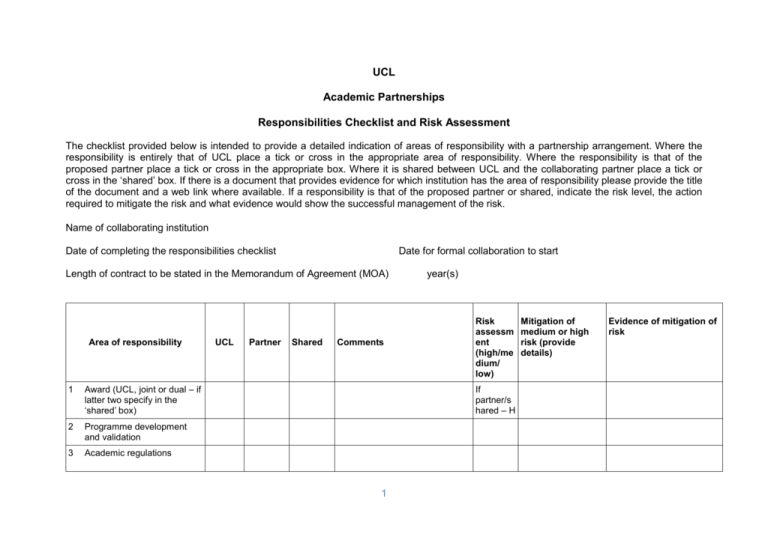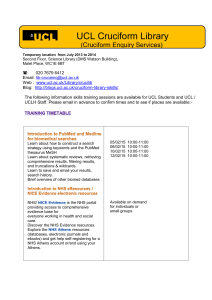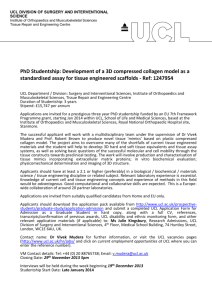Academic Partnerships Responsibilities Checklist and Risk
advertisement

UCL Academic Partnerships Responsibilities Checklist and Risk Assessment The checklist provided below is intended to provide a detailed indication of areas of responsibility with a partnership arrangement. Where the responsibility is entirely that of UCL place a tick or cross in the appropriate area of responsibility. Where the responsibility is that of the proposed partner place a tick or cross in the appropriate box. Where it is shared between UCL and the collaborating partner place a tick or cross in the ‘shared’ box. If there is a document that provides evidence for which institution has the area of responsibility please provide the title of the document and a web link where available. If a responsibility is that of the proposed partner or shared, indicate the risk level, the action required to mitigate the risk and what evidence would show the successful management of the risk. Name of collaborating institution Date of completing the responsibilities checklist Date for formal collaboration to start Length of contract to be stated in the Memorandum of Agreement (MOA) Area of responsibility 1 Award (UCL, joint or dual – if latter two specify in the ‘shared’ box) 2 Programme development and validation 3 Academic regulations UCL Partner Shared Comments year(s) Risk assessm ent (high/me dium/ low) If partner/s hared – H 1 Mitigation of medium or high risk (provide details) Evidence of mitigation of risk 4 Programme specifications and intended learning outcomes 5 Setting summative assessments 6 Setting formative assessments (where appropriate) 7 Nomination and appointment of external examiner(s) 8 First marking of student assignments 9 Moderation or second marking of assignments 10 Giving feedback to students on their assignments 11 Arrangements for supervision (PGR only) 12 Research governance (PGR only) 13 Research ethics approval procedures (PGR only) 14 Student recruitment and selection 15 Approving admission of students to the programme 16 Withdrawing a student from the programme 17 Monitoring student admission, retention and 2 completion 18 Student complaints and appeals 19 Maintenance of student records 20 Producing annual quality monitoring reports and module evaluations 21 Consideration of annual quality monitoring reports 22 Periodic programme review 23 Provision for developing staff teaching and assessing skills at higher education level 24 Provision for development and scholarship of staff involved 25 Monitoring the quality of higher education teaching and learning 26 Student orientation and induction 27 Academic tutorial/review and monitoring/academic guidance 28 Geographical location of students (state country if not UCL) 29 Provision of teaching venue/accommodation and facilities, e.g. room, data 3 projector, PC. 30 Provision of local IT support for teaching 31 Virtual learning environment for online learning support, e.g. Moodle 32 Library facilities 33 Academic tutorial support for assessments 34 Guidance for progression and careers advice 35 Student welfare support including disabilities support 36 Liaison with and involvement of employers (where appropriate) 37 Student complaints system 38 Student academic misconduct system 39 Formal student disciplinary procedures 40 Student academic appeal system 41 Collecting and acting upon student feedback/opinion 42 Student Handbook, Programme and module 4 information available to students 43 Information about higher education, for example, on web or prospectus 44 Procedures for ensuring the accuracy of information about higher education 45 Marketing material When completed, this form should be returned along with the New Academic Partnership Proposal form plus Due Diligence Checklist and business case and Site Visit Checklist (if relevant) to Cat Edera, Academic Standards and Quality Manager, Academic Services, c.edera@ucl.ac.uk. CE/AS July 2015 V2 5










![Informed Consent Form [INSERT YOUR DEGREE]](http://s3.studylib.net/store/data/007051752_2-17c4425bfcffd12fe3694db9b0a19088-300x300.png)
